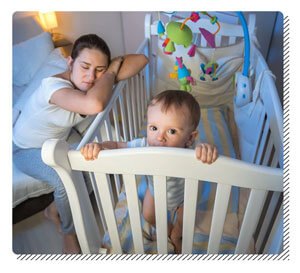Baby Crying in Sleep? Tips to Settle Baby at Night

Perhaps the biggest challenge for you, a new parent, has been getting your child to peacefully go to sleep. Trust us, you’re not alone in this – there have been countless parents who get minimal amounts of shut-eye before they’re woken up by their baby crying from the other room. And each baby’s cry is different – there are numerous possible reasons as to why your baby could be expressing discomfort.
But don’t worry, you won’t have to sit there scratching your head in confusion, trying to figure out what your baby needs. Here is a list of reasons why your baby won’t settle at night – and also some tips to overcome these trying times. Before soon, your baby will happily be in dreamland while you can get that much-needed rest as well.
Why my Baby Wakes up Crying?
There are so many reasons why your baby may find themselves unable to sleep at night. All their fears and discomforts may manifest in the form of loud crying, which will be a stressor for you too. It’s a lose-lose situation for everyone concerned.
However, if you were aware of why your baby was up at all hours of the night while crying, you would know how to calm them down. So without further ado, here are some possible explanations to figure out why your baby is crying at night for no reason or if your baby wakes up screaming.
1. Baby is Hungry

The simplest explanation for your child’s seemingly unreasonable amount of distress may be hunger. Your baby may be waking themselves up in the middle of the night quite simply because they’re hungry – and since they cannot convey it to your verbally, they choose to express their distaste through loud crying.
Newborns, especially, need frequent feeding – which is why this is the stage where you have to accept that you’re going to be up at all hours feeding them. This will more than likely tide them over for the night.
With older babies, however, it is not recommended to get them into the habit of doing so – so if they’ve been fed enough during the day, attempt to let them sort out the crying alone for a while. We know it’s hard, but it’s an important step towards independence.
2. Teething

Babies usually start getting their first tooth anywhere around the age of six months. This process, usually called teething, can be quite painful for your child. It will be unpleasant for them for the first couple of days, and it can cause them to start crying in the middle of the night or even develop rashes, loss in appetite or vomit mucus.
At times like these, they’d need to be comforted. If you notice that they’re teething, you can also take them to the pediatrician to get them any pain-relievers or teething gels they may need. You can also try massaging their jaw for extra comfort.
3. Separation Anxiety

It is natural for babies to develop a sense of separation anxiety very early on, usually lasting till they develop a sense of object permanence. What this entails is that when babies are unable to see you physically, they assume you don’t exist anymore.
This may seem quite silly to us, but it’s a very real fear for babies. Because of this phenomenon, babies develop separation anxiety and will be more unwilling than usual to let you go for any period of time. This can manifest in the form of fits, tantrums, or wailing.
What you can do during this period is calm your baby and help them understand that you’re just a few feet away. Gradually, you can begin increasing the time between these calming-down sessions.
4. Sleep Regression

During the regression stage of sleep for your baby, you might begin to feel that they’ve suddenly taken several steps back in the developmental milestones area. If they had been going to sleep peacefully and staying asleep till the morning before, and are now suddenly refusing to do so, then it’s most likely that they’re going through a sleep regression.
Your baby’s sleep regression period can occur any time – from when they’re four months old to a year old. When this occurs – just stay calm and practice some sleep training techniques with them again. It’s no cause for worry, this regression period is totally temporary and you’ll be back on track before long!
5. Baby is Learning New Skills

It is quite possible that your baby might just be trying out some new skills that they have learned by completing their developmental milestones! These skills include rolling, crawling, sitting up, or standing up – and since babies are energetic beings, they may take it upon themselves to practice these skills at the wee hours of the night.
If they’re up practicing these skills, then chances are they’ll find it unable to go back to sleep anytime soon. Of course, this includes you having to wake up and put them to sleep.
6. Cold or Colicky

It may be quite possible that your child might just be going through an episode of common cold or colic. The former, as the name suggests, is fairly common – they might experience blocked noses and respiratory problems because of this. While it’s not a cause for worry, you might contact your pediatrician for techniques you can apply to soothe them, or if they need any medicines.
Colic, on the other hand, can be characterized by quite intense episodes of crying and screaming that may be distressing for both you and the baby. Luckily, colic goes away with time, but it’s a definite explanation for why your newborn won’t settle at night.
Also read: Best Anti Colic Bottles in UK
7. Reflux

Reflux occurs in all babies, so it is definitely not a cause for worry. However, it is unlikely that reflux might be a cause for pain with your baby. It can result in poor digestion, but your baby will not usually mind it as much. Reflux in babies can look a lot like tiny amounts of vomit after they’re done being fed.
However, a tiny number of children may suffer from GORD or gastro-esophageal reflux disease – which on the other hand is indeed a cause of immense distress for children, so if you’re noticing that your baby is grunting and has difficulties in gaining weight and taking to milk, then you might want to consult your pediatrician just to be safe.
Tips to Settle your Baby to Sleep
Now that we’ve covered all possible reasons as to why your baby is crying at night for no reason, we can move on to the ways in which you can calm your baby down and put them right back to sleep. This means longer periods of sleep for both you and your baby. Chances are, you’ll find at least one way that you can apply in the nursery to get your baby to enjoy some peaceful sleep in dreamland.
1. Nappy Check

Have you tried checking on your baby’s nappy yet? There are a few chances that they may have just had a midnight wee, which makes them extremely cranky and irritable. In cases like these, the first logistical problem you want to sort out is whether they have a soiled diaper or not. Replace their diapers in the middle of the night then watch the difference it makes – sooner than later, you will have an armful of your sleepy baby.
This is perhaps the quickest way to make sure that your baby goes to sleep satisfied and feeling clean.
2. Feeding

Babies under the age of six months may need frequent nighttime feedings. This part can be a difficult period for you but don’t worry, it won’t last forever. Just make sure that you’re feeding your baby quickly and making as little eye contact with them as possible. This ensures that your little one does not engage you any further than a few minutes, and everyone will be asleep again after the feeding session.
Babies over the age of six months can be a little easier to manage – most of them usually last the entire night without a single post-dinner feeding session!
But of course, not all babies are the same, so there might be some nights where you’re scrambling to wake up to feed them once again. This works like magic and sends kids back to sleep immediately.
3. Cuddling or Rocking

Motion or movement is extremely important for the baby to be easily soothed. There’s something about repetitive motions that are very calming to your child, and you should take full advantage of this! This works especially well for babies who have nightmares or are just too terrified to go to sleep on their own.
Rocking or cuddling them works like a charm! However, it is possible that babies might become addicted to rocking and might not go to sleep without it, so remembering to be sparing with these. You can also use a hammock or a crib to rock your baby! It puts less pressure on your arms and makes life easier for you generally.
Also read: Baby Won’t Sleep in Crib/Cot? Try These Tips
4. Give them a Teething Ring
If your baby has recently begun teething, then it may be a difficult time for them presently. It is advisable that you invest in a teething ring for them – this can help soothe their pain slightly and satisfy their urges of gnawing things.
5. Give them their Favorite Toy

At any age, your baby is bound to have a toy that they’re always seeking during playtime. When they’re waking up in the middle of the night suddenly, it is important that they need to be soothed back to sleep.
Give them that toy that comforts them, and watch them go to sleep in a jiffy. It doesn’t have to be a toy – it can be a piece of soft cloth or something that smells like you. Chances are that they were just looking for something to calm them down, and this can do the trick!
6. Let them settle by themselves
When your baby is slightly older, it is perhaps best that they should be left to their own devices for a little bit. Your baby may just be unused to being alone and being away from you for hours. This can be the reason for their frequent wakings during the night – and while it may be sad for you, it is good for them to have that independence for a bit. Cuddling them simply won’t do the trick, and they may get used to your company to a degree that they develop separation anxiety.
7. Taking them into your bed

Sometimes, when it feels like perhaps they’re crying a bit too much more than usual, then having them cry it out simply won’t work. Maybe they’ve been terrified by a nightmare, and there’s no way they’ll go to sleep by calming themselves down.
In cases like these, after you’ve let them cry for a while and see no signs of it abating, then having them close to you is the best way of soothing them. Let them know you’re nearby and cuddle them to sleep!
8. Call a doctor
If there’s no other reason for your baby crying in their sleep, then perhaps the issue is internal. If you’ve ruled out all possible causes, then it is better to be safe than sorry by calling your doctor and checking in with your baby’s health.
Most likely, it may be nothing serious and it might just be a bad sleep spell for your little one. But it’s possible that they might be in pain or have an ear infection that can go undetected. In cases like this, it is best to call your doctor to reassure yourself.
How to Reduce Night Awaking
Now that you know ways that you can calm a distressed baby down at night and put them back to sleep, there are still some things you can do to make sure that they’re not waking up in the middle of the night. The less your baby wakes up in the middle of the night, the fewer problems they have stayed asleep – and there are a few simple steps that you can make to make sure of that.
1. Develop a Bedtime Routine
It’s extremely important for your baby to have a bedtime routine that they follow every day. It’s important because children are very impressionable, especially as far as routines are concerned – they become attached to routine and monotony very easily, and will become cranky if broken out of it.
Develop a bedtime routine that includes feeding and then a break before sleeping. This break can include activities like massaging or playing or reading a bedtime story to them – anything that may calm them down.
2. Dream Feed
Dream feeding is a way for your baby to go to sleep easily and then make sure they do not wake up. The term suggests that you feed your baby while they’re half-asleep so that they’re not roused with too much excitement happening around them. This also ensures that they don’t wake up in the middle of the night to ask for a feeding.
3. Sleep in the same room
If your baby is extremely young, it is recommended to many parents to continue to sleep with your baby. It is reassuring for them to know that you’re in the same physical space as them, and they go to sleep with this knowledge. It helps ease their mind and prevents nightmares, as they are already calm when they’re going to sleep. When they’re past the age of six months, however, it is recommended to practice this step less and less.
4. Dim the lights & Reduce noise at night
Your baby needs to know that nighttime is boring and that they need to go to sleep. To reinforce this, try to keep stimulation for your baby to a minimum. Keep things quiet at night, so your baby is not compelled to grow curious about everything going on around them. Similarly, dim the lights so your baby is further compelled to go to sleep without looking for spontaneous playtime.
Our Advice
The first thing we want to repeat at the end is that it is perfectly normal for young babies to be waking up frequently in the middle of the night. Remember that it is extremely new for them to be alone and going to sleep this way – so naturally, they’re anxious enough to wake themselves up crying. But don’t worry, this too shall pass. Just keep in mind the possible techniques you can implement to reduce the frequency of these nighttime wakings.

Laura is a trained primary teacher who takes a profound liking in interacting with and bringing out the best in children. She is also an ISSA certified pediatrician with an extensive practice of over 12 years. Laura comprehends the needs of infants and now compresses her expertise into writing thorough parenting guides to aid new parents.






